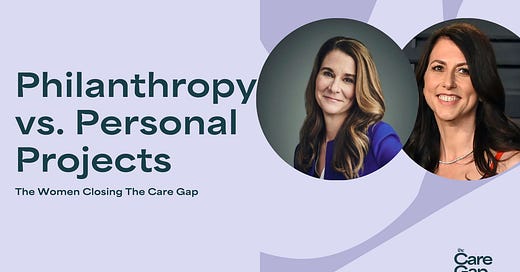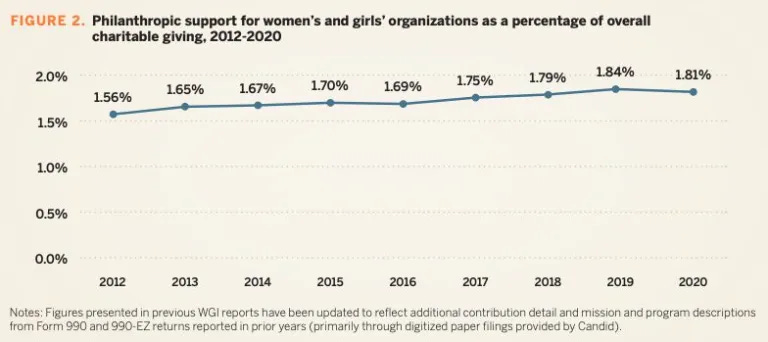Welcome to The Care Gap This Week!
Last week was super exciting in the world of philanthropy! Hence, we’ll be diving into a compelling theme: the stark contrast between how female and male billionaires use their wealth. While women like Melinda French Gates focus on philanthropy to close the care gap, high-profile men such as Jeff Bezos and Elon Musk invest in personal projects like space exploration. Let's explore how this difference in focus impacts gender equity and societal progress.
TLDR:
Philanthropic Women: Melinda French Gates is leading efforts to close the care gap with a $1 billion donation over the next two years.
Contrasting Investments: Men like Jeff Bezos and Elon Musk channel their wealth into personal ambitions, such as space exploration.
Gender Equity Focus: French Gates’ philanthropy emphasizes gender equity and addresses critical issues like maternal mortality and reproductive rights.
Economic Power: Women's philanthropy is crucial in closing the care gap and tackling societal inequities.
Philanthropy in Action:
Melinda French Gates is a prime example of a woman using her economic power to make a significant impact on societal inequities. She recently announced a commitment to donate $1 billion over the next two years to support women’s rights and family-related causes globally. This includes substantial grants to organizations working on reproductive rights, maternal health, and economic empowerment.
French Gates' initiatives, conducted through her organization, Pivotal Ventures, focuses on closing the gender gap by funding a lot of organizations addressing the care gap and inequities between men and women. Her dedication to this cause includes elevating the important work groups like the National Women’s Law Center, Moms Rising and the National Domestic Workers Alliance are doing across the United States. This strategic philanthropy aims to enhance women’s economic and political participation, close the wage gap, and compensate for care work traditionally done by women that is often undervalued and unnoticed.
Other prominent women such as Mackenzie Scott, who donated $5.7 billion in 2020 alone, and Sara Blakely, among many others, have committed to the Giving Pledge, promising to give significant amounts to charity. In March 2024, Scott's donations has reached $17.2 billion. Forbes reported, "the unrestricted and ultimately more trusting nature of Scott's philanthropy is the exception, not the norm in their world." Scott's unprecedented donations demonstrate the powerful impact of women's philanthropy.
Contrasting Approaches: Male Billionaires
In stark contrast, high-profile male billionaires such as Jeff Bezos and Elon Musk have chosen to invest heavily in personal projects like space exploration. Bezos’ Blue Origin and Musk’s SpaceX represent significant technological advancements but have less direct impact on addressing social inequalities. Some argue leads to further inequities and environmental damages. This trend underscores a broader pattern where men with substantial wealth prioritize personal ambitions over philanthropic endeavors.
Investing in Causes vs. Personal Projects
Research from The Center on Philanthropy at Indiana University shows that women with significant financial resources are more likely to invest in causes they care deeply about, particularly those related to social justice, healthcare, and education. This philanthropic approach not only addresses immediate needs but also fosters long-term systemic change. Women’s philanthropy is a testament to their deep concern for inequity and their commitment to creating a more equitable world.
When Women Gain Economic Power
As women like Melinda French Gates gain economic power, their influence in the philanthropic sector grows. Melinda French Gates focusing on the mental and physical health of women and girls worldwide, exemplifies this trend. Her work highlights the essential role of women's philanthropy in tackling issues such as gender inequality, access to education, and healthcare disparities. The current state of maternal health across the United States and around the world is alarming. For instance, the U.S. has one of the highest maternal mortality rates among developed countries. Globally, women and girls face significant health disparities, often exacerbated by limited access to care and support services.
Closing the care gap is crucial for addressing the broader health gap, particularly in women's healthcare. For example, a Harvard Health study showed that 70% of those affected by chronic pain conditions are women, whereas 80% of pain research are conducted on men. Other research shows that resources are often disproportionately allocated to diseases that primarily affect men. This is not shocking considering the general apathy society shows towards issues that affect women from family planning, menstruation, breastfeeding, maternity leave, reproductive rights and many more.
By investing in organizations focused on closing the care gap between men and women, we can prioritize women’s health, and take a fundamental step toward achieving gender equity.
Elevating The Role of Men in Caregiving
Interestingly, French Gates' philanthropy also supports men who want to change the care giving space. By funding initiatives that encourage men to take on more caregiving roles, she addresses the root causes of the gender gap. This inclusive approach recognizes that closing the care gap benefits everyone, not just women.
For example, Equimundo, the Center for Masculinities and Social Justice, plays a pivotal role in transforming caregiving norms. Their "State of the World's Fathers 2023" report reveals that both men and women are calling for care to be central to their lives, requiring an overhaul of power structures, policies, and social norms. This report underscores the need for shared caregiving responsibilities and highlights the progress made and the challenges that remain.
Promoting men's caregiving is essential for gender equality and benefits everyone in society. Policies supporting paid leave and workplace flexibility are critical for achieving these goals.
Celebrating Independent Initiatives
It's important to recognize Melinda French Gates' efforts as her own, independent from her previous collaborations with her ex-husband Bill Gates. Her initiatives reflect her personal commitment to social change, underscoring the significant role women play in closing the care gap through targeted philanthropy.
Moving Forward
It is important to highlight that despite representing more than half of the U.S. population, women and girls receive less than 2% of all philanthropic activity in the country. The Women & Girls Index (WGI) reports that while giving to women’s and girls’ organizations increased in 2020, it lagged behind the overall growth in charitable giving. Efforts by female philanthropists like Melinda French-Gates, Mackenzie Scott, J.K. Rowling, Sara Blakely, and others aimed to address this funding gap and support organizations dedicated to women’s and girls’ causes is much needed and appreciated.
To close the care gap and achieve true gender equity, we must support efforts that reduce the caregiving burden on women and ensure that they can fully engage in the workforce. This includes advocating for paid family leave, affordable childcare, and flexible work arrangements.
Philanthropic efforts should also integrate caregiving resources into their support systems to empower women effectively. By recognizing and addressing these disparities, we can work towards a future where the care load is shared more equally, allowing everyone to thrive both at home and in their careers. One of the fundamental truth we believe at Caring Africa, a nonprofit I founded in Nigeria to close the care gap for women and families across the continent is that care is fundamental to how women show up in their personal lives, homes, workplaces, and society. By closing the care gap, we can effectively close the wage gap, the funding gap, the gender gap. When women no longer suffer from time poverty, and can divert that time and resource to improving their personal growth and wellbeing, women can then go on to live healthy and fulfilling lives. This is our north star.
As we continue these conversations, let's draw inspiration from leaders like Melinda French Gates and work together to close the care gap in our homes, workplaces, and communities.
By recognizing and supporting the unique ways women are using their economic power, we can foster a more equitable and just society.
Global Care Memo
Childcare Is More Expensive Than Rent For The Average American Family. Child care costs have surged so much that researchers say having more than one kid in care is pricier than rents in every US state.
What Is Life Like When We Subtract Work From It? Sabbaticals can give people an invaluable opportunity to rest and reflect on their identity beyond their job.
California’s Care Workforce: An Overview of Needs, Opportunities, and Challenges
New U.S. Workforce Report: Nearly 70% of Family Caregivers Report Difficulty Balancing Career and Caregiving Responsibilities, Spurring Long-Term Impacts to U.S. Economy
Important Reminders for Your Child’s Upcoming Week at Camp LadyGulch! Please read carefully so your kid can have the BEST SUMMER EVER!
The Care Gap is written by Blessing Adesiyan, Founder & CEO of Caring Bloc, the holding co. for The Care Gap, Caring Africa, and Caring Blocks where she is on a mission to close the care gap for women, families, and economies through content, advocacy, and technology. Follow @blessing.adesiyan @caringbloc for more.









It seems that regardless of whether the money comes from women or men, geographic power is still at play. Pivotal Venture, for example - when you sign up for the newsletter they send you a link to a survey which is so clearly US centric. You need a US zip code to be able to engage. I find this so parochial.